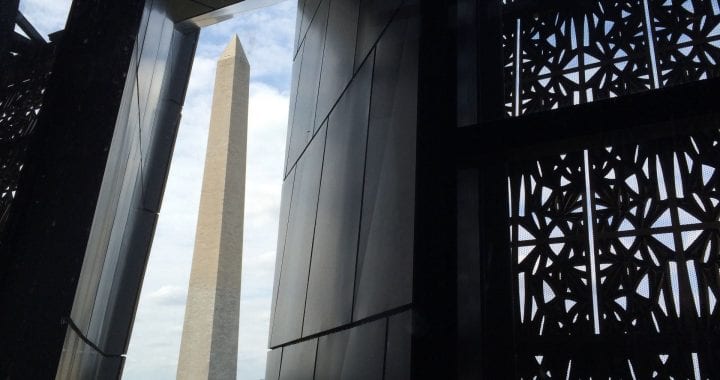Museums: Humanities in the Public Sphere
NEH Summer Institute for College and University Teachers
Washington, DC, June 30-July 28, 2019
Museums: Humanities in the Public Sphere is an in-depth exploration of museums and curated cultural collections around Washington, D.C. This four-week NEH Summer Institute for College and University Teachers will bring the rich and diverse histories of America’s public museums into wider use for teaching and research in the humanities. The Institute approaches museums as sites for interdisciplinary inquiry into advances in humanistic and scientific research, the effects of ongoing international conflicts, the speed of evolving technologies, and ethical debates over privacy and sustainability and cultural heritage. These explorations are guided by weekly lectures and seminars led by six outstanding Visiting Faculty and a renowned Visiting Artist, working together with local museum specialists. Complemented by carefully chosen readings, excellent library resources, and targeted museum visits as case studies, the Institute is guided by the principle that museums offer windows on the educational, ethical, and cultural debates that define the humanities today. Home to dozens of public and private museums, Washington, DC will serve as a laboratory for a collective exploration of these debates. The Institute will be co-directed by Professor Karen Bassi, University of California at Santa Cruz (UCSC) and Dr. Gretchen Henderson, Georgetown University and UCSC.
Location of the Summer Institute
The Summer Institute will be hosted at Georgetown University in Washington, DC, known for its program in Art and Museum Studies, new initiatives in Public Humanities, and excellent scholarly and logistical resources. This location offers easy access to the wide range of public and private museums, libraries, and cultural collections in the nation’s capital and will serve as the hub for the Institute’s activities. Situated near a historic neighborhood, Georgetown University provides an ideal location with frequent shuttles to metro stations that give easy access to all the major sites and museums in Washington, DC. Grocery stores, restaurants, coffee shops, and other amenities lie within walking distance or are accessible by campus shuttles and bus routes. The campus also participates in the city’s BikeShare program and connects to a number of routes and trails for Summer Scholars to use as alternative transportation. Lectures will be held in the Murray Room overlooking the Potomac River with a view of the skyline of Washington, DC and its museums and monuments. Housing for Visiting Faculty and Summer Scholars will be provided in the University’s newly renovated air-conditioned apartments.
Format of the Summer Institute
During the first three weeks of the Institute, two visiting scholars will be in residence. Each will deliver a substantial formal lecture on the week’s theme, based on a list of assigned readings. The day following his or her lecture, each scholar will meet with the participants and the Directors in a seminar setting. These seminars are designed to encourage close collaborative study of primary and secondary sources, and cross-disciplinary approaches to a common set of materials. At the end of each week, the Directors will lead a summary discussion of the assigned readings, lectures, and seminars aimed at synthesizing the material, establishing its multi-disciplinary implications, and building bridges to the following week’s theme.
In addition to the scheduled lectures and seminars by visiting scholars, each week will include curated site visits to selected museums, practica and digital workshops guided by museum specialists, and informal pre-dinner gatherings. Each participant will also be invited to attend a working dinner with two of the visiting scholars during the Institute. These social occasions will provide an opportunity for interactions between visiting scholars and participants, as will the site visits arranged during the first three weeks.
Week 4 of the NEH Institute will be structured around a series of moderated colloquia at which the participants will present their work-in-progress, followed by a question and answer period. Each of the six colloquia, to be scheduled over three days, will consist of four presentations each. Following the colloquia, the Directors will facilitate a final seminar focusing on provisional conclusions, methodological challenges, and directions for future research and collaboration.
Please see our Daily Schedule for more detailed information.
NEH Summer Scholars Stipend
Individuals selected to participate in this four-week NEH Institute will each receive $3,300. Stipends are intended to help cover travel expenses to and from the project location, books and other research expenses, and living expenses for the duration of the period spent in residence. Stipends are taxable. We will be staying at Georgetown University and your housing expenses will be deducted from your stipend. Applicants to NEH projects should note that supplements will not be given in cases where the stipend is insufficient to cover all expenses.

